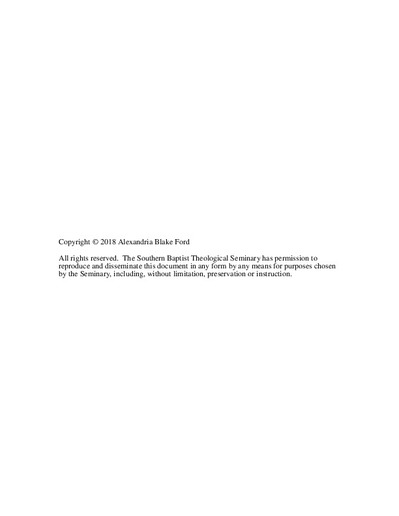| dc.contributor.advisor | Bowen, Danny R. | |
| dc.contributor.author | Ford, Alexandria | |
| dc.date.accessioned | 2018-06-07T20:12:05Z | |
| dc.date.available | 2018-06-07T20:12:05Z | |
| dc.date.issued | 2018-06-07 | |
| dc.identifier.uri | http://hdl.handle.net/10392/5601 | |
| dc.description.abstract | Christocentric spiritual formation approaches that incorporate the physical body are lacking in the literature base. The physical body plays a crucial role in spiritual formation; failure to recognize the significance of human embodiment in this way neglects a fundamental aspect of the imago Dei. This thesis researches the biblical view of human embodiment and assesses how the physical body relates to spiritual formation. Often, the soul⎯or spiritual dimension of believers⎯is elevated at the expense of the physical body within the Christian context due to insufficient theology of human embodiment. This is often rooted in a dualistic, compartmentalized understanding of humanity. The relationship between the physical body and spiritual formation is rooted in an evangelical theology of human embodiment founded in Scripture, which is necessary for a holistic understanding of the human person. The Bible demonstrates that God has created the whole person with the purpose of bringing glory to himself. | en_US |
| dc.subject.lcsh | Human body--Religious aspects--Christianity | en_US |
| dc.subject.lcsh | Human body--Biblical teaching | en_US |
| dc.subject.lcsh | Spiritual formation | en_US |
| dc.title | The Implications of an Evangelical Theology of the Body for Christocentric Spiritual Formation | en_US |
| dc.type | Electronic dissertation | en_US |
| dc.type | Text | en_US |
| dc.publisher.institution | Southern Baptist Theological Seminary | en_US |

